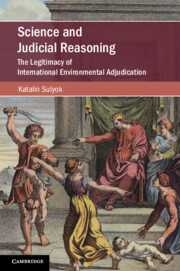Book contents
- Science and Judicial Reasoning
- Cambridge Studies On Environment, Energy And Natural Resources Governance
- Science and Judicial Reasoning
- Copyright page
- Dedication
- Contents
- Tables
- Foreword
- Acknowledgements
- Author Note
- Table of Cases
- Abbreviations
- Part I The Three-Fold Challenge of Engaging with Science in International Environmental Adjudication
- Part II Techniques for Judicial Engagement with Science in the Practice of International Courts and Tribunals
- 3 Judicial Engagement with Science in the Environmental Case Law of the International Court of Justice
- 4 Science in the Practice of Inter-State Arbitral Tribunals
- 5 Science in the Environmental Jurisprudence of Regional Human Rights Courts
- 6 Scientific Claims before the WTO
- 7 Science in the Practice of Investment Arbitral Tribunals
- 8 Science Appears before the International Tribunal for the Law of the Sea
- Part III Engaging with Scientific Knowledge in the Judicial Reasoning
- Bibliography
- Index
6 - Scientific Claims before the WTO
from Part II - Techniques for Judicial Engagement with Science in the Practice of International Courts and Tribunals
Published online by Cambridge University Press: 15 October 2020
- Science and Judicial Reasoning
- Cambridge Studies On Environment, Energy And Natural Resources Governance
- Science and Judicial Reasoning
- Copyright page
- Dedication
- Contents
- Tables
- Foreword
- Acknowledgements
- Author Note
- Table of Cases
- Abbreviations
- Part I The Three-Fold Challenge of Engaging with Science in International Environmental Adjudication
- Part II Techniques for Judicial Engagement with Science in the Practice of International Courts and Tribunals
- 3 Judicial Engagement with Science in the Environmental Case Law of the International Court of Justice
- 4 Science in the Practice of Inter-State Arbitral Tribunals
- 5 Science in the Environmental Jurisprudence of Regional Human Rights Courts
- 6 Scientific Claims before the WTO
- 7 Science in the Practice of Investment Arbitral Tribunals
- 8 Science Appears before the International Tribunal for the Law of the Sea
- Part III Engaging with Scientific Knowledge in the Judicial Reasoning
- Bibliography
- Index
Summary
This chapter surveys several entry points through which science becomes legally relevant in WTO law and in trade disputes. It reviews the elaborate techniques of WTO panels and the Appellate Body to engage with scientific evidence in cases involving environmental and health risks. The chapter addresses the WTO’s expert consultation system and discusses the changing canons of deference afforded to WTO members in adopting science-based SPS measures. It extensively analyses the epistemic nature and significance of the two-stage standard of review, under which WTO dispute settlement bodies scrutinize the coherence of the reasoning provided by the risk assessor. The chapter concludes with identifying argumentative techniques in the WTO jurisprudence justifying adjudicatory conclusions concerning scientific evidence and arguments. It distinguishes reasoning methods built on scientific, intuitive, and legal rationality. The chapter also identifies an additional particular reasoning style, which utilizes concepts that are labelled as 'hybrid' benchmarks.
Keywords
- Type
- Chapter
- Information
- Science and Judicial ReasoningThe Legitimacy of International Environmental Adjudication, pp. 178 - 211Publisher: Cambridge University PressPrint publication year: 2020

